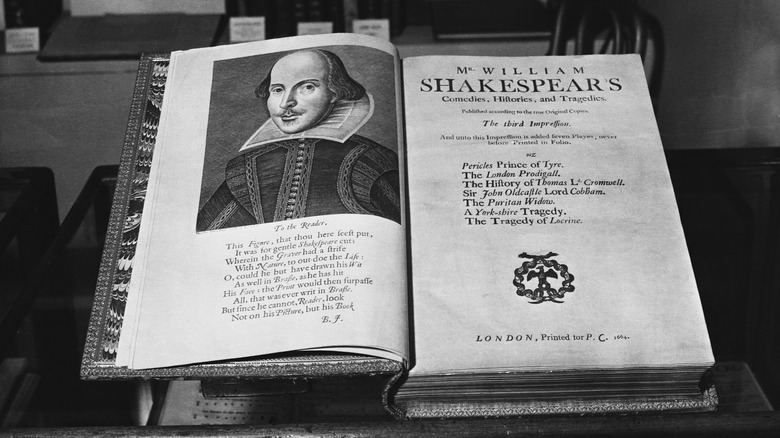The Strange Origin Of The Phrase 'Apple Of My Eye'
Idioms have a funny way of morphing over time. Take the phrase "the apple of your eye." Ask anyone and they'll tell you it means a term of endearment, someone who holds a special place in your heart. But, like most things lost in translation, the "apple" part of the phrase originally meant something else — "little man in his eye," according to Jewish Link. In the Hebrew Bible, where the phrase originates, the word used was "ishon" — the tiny human in question.
Additionally, the idiom as a phrase of affection came much later. When the phrase was first coined, the meaning of the little man was nothing more than the center of the eye, the pupil. It's likely that "the little man in his eye" referred to the reflection a person made in someone's pupil, reports Deseret News. In other words, when you look directly into someone's eyes, you'll see a little reflection of yourself in that person's pupils.
An eye for an apple
It took some time for the word to go from "the little man in the eye" to being translated as that forbidden food, the apple. Historical records suggest that the use of the idiom first entered the vernacular in the ninth century as a translation of the Latin phrase "pupilla oculi," or "pupil of the eye," (per Jstor). It's also worth noting that the original Latin meaning of "pupilla" meant "little girl," (per Jewish Link), which is remarkably similar to the literal translation of the Hebrew word. The King James version of the Bible, which was translated in 1611, offers one example of the idiom's usage in Psalms 17:8: "Keep me as the apple of the eye. Hide me under the shadow of thy wings."
Despite the influence of both the Hebrew and Latin languages, the King James version of the Bible uses "apple" to denote the eye's pupil instead of "the little man in the eye." And as perplexing as this phenomenon is, the word doesn't appear to be a mistranslation. According to Jewish Link, while the phrase gained usage in the ninth century, it continued to be used on into the 17th century. That includes appearing in several passages in one of the most famous religious books of all time, the Bible.
The phrase in a 'Midsummer's Night's Dream'
It wasn't just the translators of the Bible who grabbed onto the phrase. The bard himself, William Shakespeare, used "apple of his eye" in "A Midsummer's Night Dream," The play was written circa 1594-ish, which means the great playwright put the word into print a decade or so before the good king's translators did. In the play, Oberon, king of the fairies, says: "Flower of this purple dye, Hit with Cupid's archery, Sink in apple of his eye." The purple flower the fairy king refers to is the pansy, (per Folger Shakespeare Library) from which the fairy king made a love potion. The potion would have the effect of Cupid's arrow on the recipients of it. That is, they would fall in madly in love with whomever their eyes laid on first.
In this instance, the apple of the eye is presumably the fertile ground on which love's fruits ripen faster than they ever would on their own. Once the pansy potion washes over the pupil, love blossoms. Here, "apple of his eye" comes closer to the meaning it carries today. However, the bard's use of the phrase additionally implies that love is blind, particularly when Cupid's arrow hits the apple of the eye with the precision of William Tell's marksmanship.
Translating it into English
The true change of the phase came from Old English in the 10th century. In Old Anglo-Saxon, the word for "apple" is "arppel." The word for "pupil" is also "arppel." Like an apple, the pupil was round. And like the pupil, the skin of the apple could, in theory, reflect a person's image back to them. So, if the word for "apple" and "pupil" were the same in Old English, then translating the sentiment as the "apple of the eye" made a lot of sense. Some of the original intent in the Hebrew changed a bit when the text was translated into English. It no longer meant "little man" or "little girl," but "apple." However, if you substitute the word "pupil" for "apple" in the line from the Psalms, the meaning of the original text becomes a bit clearer. "Keep me as the pupil of the eye. Hide me under the shadow of thy wings."
In other words, the author of the request in Psalms is asking God to keep a pupil on him. The eye's pupil allows people to see. Because of this, it's to be cherished. And here, requester in Psalms is literally the little man of God's eye, someone to be cherished by the Almighty. This, coupled with the influence of the English translation and the influence of its use in literary canon, may have created a more nuanced meaning than the original phrase intended.



